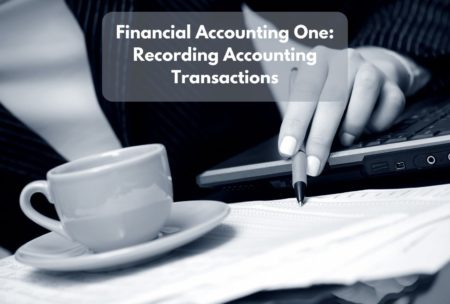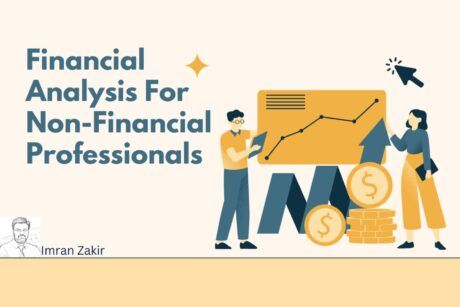This course is designed for those interested to learn the basics of financial accounting; the core concepts, foundational accounting skills including accounting terms, double entry accounting system, and recording transactions using both the accounting equation and debits and credits. Read more.
Robert (Bob) Steele CPA, CGMA, M.S. Tax, CPI
Access all courses in our library for only $9/month with All Access Pass
Get Started with All Access PassBuy Only This CourseAbout This Course
Who this course is for:
- Aspiring accounting students who have an interest in the topic
- Accounting professionals
- Anyone who wants to learn accounting
- Accounting and business students who want a reference source to the material they can actually keep, unlike most digital textbooks used in most accounting programs these days
- Business professional who want a comprehensive reference to standard financial accounting topics they can refer to
What you’ll learn:
- Accounting Objectives, Accounting Equation, and Ethics
- Financial Statements
- Accrual Method, Cash Method, Revenue and Expense Recognition
- Financial Transaction Rules and Thought Process
- Recording Transactions Using Accounting Equation
- Debit and Credit Rules, and Thought Process
- Record Cash Transactions Using Debits and Credits
- and much more
Requirements:
- This course is an excellent course for beginners as well as advanced learners. We start from the basics and move all the way through financial accounting topics in a systematic way. We will be using some Microsoft Excel worksheet, but we will start off slow as we learn Excel as well. If you do not have Excel, you may be able to open the files using Google Sheets, which is free. If you do not have either of these options, you can move forward without this component of the course. However, Excel worksheets are where learners get to really engage with the material and work through problems. Therefore, we do suggest getting access to Excel or Google Sheets at all possible.
This course will cover accounting core concepts, foundational accounting skills needed for all levels of accounting including the accounting terms, the double entry accounting system, and recording transactions using both the accounting equation and debits and credits. These are the accounting fundamentals which most accounting courses spend far too little time on. The better we understand these accounting foundation topics, the better we will do in all accounting concepts.
Like practicing catch or going over those musical scales, practicing the accounting fundamentals is time well spent for beginners as well as experienced accountants. We are never too smart to practice accounting fundamentals. This course will thoroughly cover the fundamentals and will provide a foundation for learning concepts that limit the likelihood of learning rules that do not always apply.
This course will provide much more structure to the journal entry process than most courses, including a detailed step by step process for thinking about how to construct financial transactions. This process will eliminate the problem of getting stuck and not knowing how to move forward. The process will also help us understand the transactions we are recording and eliminate the problem of learning concepts that do not apply in all circumstances.
Our Promise to You
By the end of this course, you will have learned the fundamentals of financial accounting.
10 Day Money Back Guarantee. If you are unsatisfied for any reason, simply contact us and we’ll give you a full refund. No questions asked.
Get started today and learn more about recording accounting transactions.
Course Curriculum
| Section 1 - Introduction | |||
| Course Overview | 00:00:00 | ||
| Downloadable Materials | 00:00:00 | ||
| Section 2 - Why Learn Accounting | |||
| Why Learn Accounting | 00:00:00 | ||
| Discussion Question | 00:00:00 | ||
| Section 3 - Accounting Objectives, Accounting Equestion, & Ethics | |||
| Accounting Objectives, Accounting Equation, And Ethics | 00:00:00 | ||
| Accounting Objectives | 00:00:00 | ||
| Accounting Equation | 00:00:00 | ||
| Ethic And Profession | 00:00:00 | ||
| Discussion Question | 00:00:00 | ||
| Section 4 - Financial Statements | |||
| Financial Statements | 00:00:00 | ||
| Balance Sheet | 00:00:00 | ||
| Income Statement | 00:00:00 | ||
| Statement Of Owner’s Equity | 00:00:00 | ||
| Balance Sheet And Income Statement Relationship | 00:00:00 | ||
| Short Calculation Problems Accounting Equation | 00:00:00 | ||
| Discussion Question | 00:00:00 | ||
| Section 5 - Accural Method, Cash Method, Revenue & Expense Recognition | |||
| Accrual Method Vs Cash Method | 00:00:00 | ||
| Revenue Recognition Principle | 00:00:00 | ||
| Cash Method Vs Accrual Method | 00:00:00 | ||
| Short Calculation Problems – Part 1 | 00:00:00 | ||
| Discussion Question | 00:00:00 | ||
| Section 6 - Financial Transation Rules & Thought Process | |||
| Financial Transaction Rules And Thought Process | 00:00:00 | ||
| Financial Transaction Rules | 00:00:00 | ||
| Financial Transaction Thought Process | 00:00:00 | ||
| Short Calculation Test Question Accounting Equation | 00:00:00 | ||
| Discussion Question | 00:00:00 | ||
| Section 7 - Recording Transactions Using Accounting Equation | |||
| Recording Transactions Using Accounting Equation | 00:00:00 | ||
| Cash Transaction – Accounting Equation | 00:00:00 | ||
| Worksheet – Accounting Equation Cash | 00:00:00 | ||
| Accounts Receivable Transactions Accounting Equation | 00:00:00 | ||
| Worksheet 3 – Accounting Equation Account Payable | 00:00:00 | ||
| Short Calculation Test Questions Accounting Equation | 00:00:00 | ||
| Discuss Question | 00:00:00 | ||
| Section 8 - Debits and Credits Defined | |||
| Debits And Credits Defined | 00:00:00 | ||
| Debits And Credits | 00:00:00 | ||
| Rules For Using Debits And Credits | 00:00:00 | ||
| Discussion Question | 00:00:00 | ||
| Section 9 - Debit & Credit Rules & Thought Process | |||
| Debit And Credit Rules – Thought Process | 00:00:00 | ||
| Journal Entry Thought Process | 00:00:00 | ||
| Trial Balance | 00:00:00 | ||
| Discussion Question | 00:00:00 | ||
| Section 10 - Record CashTransactions Using Debits and Credits | |||
| Record Cash Transactions Using Debits And Credits | 00:00:00 | ||
| Cash Journal Entries With Cash | 00:00:00 | ||
| Worksheet Prob 4 – Debits And Credits Cash | 00:00:00 | ||
| Discussion Question | 00:00:00 | ||
| Section 11 - Record Accounts Receivable Transactions Using Debits and Credits | |||
| Accounts Receivable Journal Entries | 00:00:00 | ||
| Worksheet Prob 5 – Debits And Credits Accounts Receivable | 00:00:00 | ||
| Discussion Question | 00:00:00 | ||
| Section 12 - Record Accounts Payable Transactions Using Debits and Credits | |||
| Record Accounts Payable Transactions Using Debits And Credits | 00:00:00 | ||
| Accounts Payable Journal Entries | 00:00:00 | ||
| Worksheet Prob 6 – Debits And Credits Accounts Payable | 00:00:00 | ||
| Short Calculation Test Questions Debits And Credits | 00:00:00 | ||
| Discussion Question | 00:00:00 | ||
| Section 13 - Record Transactions to General Ledger | |||
| General Ledger | 00:00:00 | ||
| Worksheet General Leger Cash | 00:00:00 | ||
| Worksheet Prob 8 – General Ledger Accounts Receivable | 00:00:00 | ||
| Worksheet Prob 8 – General Ledger Accounts Payable | 00:00:00 | ||
| Multiple Choice 1 – Questions Accounting Terms Accounting Equation | 00:00:00 | ||
| Discussion Questions | 00:00:00 | ||
| Section 14 - Comprehensive Problem | |||
| Comprehensive Problem | 00:00:00 | ||
| Comprehensive Problem Part 1 | 00:00:00 | ||
| Comprehensive Problem Part 2 | 00:00:00 | ||
About This Course
Who this course is for:
- Aspiring accounting students who have an interest in the topic
- Accounting professionals
- Anyone who wants to learn accounting
- Accounting and business students who want a reference source to the material they can actually keep, unlike most digital textbooks used in most accounting programs these days
- Business professional who want a comprehensive reference to standard financial accounting topics they can refer to
What you’ll learn:
- Accounting Objectives, Accounting Equation, and Ethics
- Financial Statements
- Accrual Method, Cash Method, Revenue and Expense Recognition
- Financial Transaction Rules and Thought Process
- Recording Transactions Using Accounting Equation
- Debit and Credit Rules, and Thought Process
- Record Cash Transactions Using Debits and Credits
- and much more
Requirements:
- This course is an excellent course for beginners as well as advanced learners. We start from the basics and move all the way through financial accounting topics in a systematic way. We will be using some Microsoft Excel worksheet, but we will start off slow as we learn Excel as well. If you do not have Excel, you may be able to open the files using Google Sheets, which is free. If you do not have either of these options, you can move forward without this component of the course. However, Excel worksheets are where learners get to really engage with the material and work through problems. Therefore, we do suggest getting access to Excel or Google Sheets at all possible.
This course will cover accounting core concepts, foundational accounting skills needed for all levels of accounting including the accounting terms, the double entry accounting system, and recording transactions using both the accounting equation and debits and credits. These are the accounting fundamentals which most accounting courses spend far too little time on. The better we understand these accounting foundation topics, the better we will do in all accounting concepts.
Like practicing catch or going over those musical scales, practicing the accounting fundamentals is time well spent for beginners as well as experienced accountants. We are never too smart to practice accounting fundamentals. This course will thoroughly cover the fundamentals and will provide a foundation for learning concepts that limit the likelihood of learning rules that do not always apply.
This course will provide much more structure to the journal entry process than most courses, including a detailed step by step process for thinking about how to construct financial transactions. This process will eliminate the problem of getting stuck and not knowing how to move forward. The process will also help us understand the transactions we are recording and eliminate the problem of learning concepts that do not apply in all circumstances.
Our Promise to You
By the end of this course, you will have learned the fundamentals of financial accounting.
10 Day Money Back Guarantee. If you are unsatisfied for any reason, simply contact us and we’ll give you a full refund. No questions asked.
Get started today and learn more about recording accounting transactions.
Course Curriculum
| Section 1 - Introduction | |||
| Course Overview | 00:00:00 | ||
| Downloadable Materials | 00:00:00 | ||
| Section 2 - Why Learn Accounting | |||
| Why Learn Accounting | 00:00:00 | ||
| Discussion Question | 00:00:00 | ||
| Section 3 - Accounting Objectives, Accounting Equestion, & Ethics | |||
| Accounting Objectives, Accounting Equation, And Ethics | 00:00:00 | ||
| Accounting Objectives | 00:00:00 | ||
| Accounting Equation | 00:00:00 | ||
| Ethic And Profession | 00:00:00 | ||
| Discussion Question | 00:00:00 | ||
| Section 4 - Financial Statements | |||
| Financial Statements | 00:00:00 | ||
| Balance Sheet | 00:00:00 | ||
| Income Statement | 00:00:00 | ||
| Statement Of Owner’s Equity | 00:00:00 | ||
| Balance Sheet And Income Statement Relationship | 00:00:00 | ||
| Short Calculation Problems Accounting Equation | 00:00:00 | ||
| Discussion Question | 00:00:00 | ||
| Section 5 - Accural Method, Cash Method, Revenue & Expense Recognition | |||
| Accrual Method Vs Cash Method | 00:00:00 | ||
| Revenue Recognition Principle | 00:00:00 | ||
| Cash Method Vs Accrual Method | 00:00:00 | ||
| Short Calculation Problems – Part 1 | 00:00:00 | ||
| Discussion Question | 00:00:00 | ||
| Section 6 - Financial Transation Rules & Thought Process | |||
| Financial Transaction Rules And Thought Process | 00:00:00 | ||
| Financial Transaction Rules | 00:00:00 | ||
| Financial Transaction Thought Process | 00:00:00 | ||
| Short Calculation Test Question Accounting Equation | 00:00:00 | ||
| Discussion Question | 00:00:00 | ||
| Section 7 - Recording Transactions Using Accounting Equation | |||
| Recording Transactions Using Accounting Equation | 00:00:00 | ||
| Cash Transaction – Accounting Equation | 00:00:00 | ||
| Worksheet – Accounting Equation Cash | 00:00:00 | ||
| Accounts Receivable Transactions Accounting Equation | 00:00:00 | ||
| Worksheet 3 – Accounting Equation Account Payable | 00:00:00 | ||
| Short Calculation Test Questions Accounting Equation | 00:00:00 | ||
| Discuss Question | 00:00:00 | ||
| Section 8 - Debits and Credits Defined | |||
| Debits And Credits Defined | 00:00:00 | ||
| Debits And Credits | 00:00:00 | ||
| Rules For Using Debits And Credits | 00:00:00 | ||
| Discussion Question | 00:00:00 | ||
| Section 9 - Debit & Credit Rules & Thought Process | |||
| Debit And Credit Rules – Thought Process | 00:00:00 | ||
| Journal Entry Thought Process | 00:00:00 | ||
| Trial Balance | 00:00:00 | ||
| Discussion Question | 00:00:00 | ||
| Section 10 - Record CashTransactions Using Debits and Credits | |||
| Record Cash Transactions Using Debits And Credits | 00:00:00 | ||
| Cash Journal Entries With Cash | 00:00:00 | ||
| Worksheet Prob 4 – Debits And Credits Cash | 00:00:00 | ||
| Discussion Question | 00:00:00 | ||
| Section 11 - Record Accounts Receivable Transactions Using Debits and Credits | |||
| Accounts Receivable Journal Entries | 00:00:00 | ||
| Worksheet Prob 5 – Debits And Credits Accounts Receivable | 00:00:00 | ||
| Discussion Question | 00:00:00 | ||
| Section 12 - Record Accounts Payable Transactions Using Debits and Credits | |||
| Record Accounts Payable Transactions Using Debits And Credits | 00:00:00 | ||
| Accounts Payable Journal Entries | 00:00:00 | ||
| Worksheet Prob 6 – Debits And Credits Accounts Payable | 00:00:00 | ||
| Short Calculation Test Questions Debits And Credits | 00:00:00 | ||
| Discussion Question | 00:00:00 | ||
| Section 13 - Record Transactions to General Ledger | |||
| General Ledger | 00:00:00 | ||
| Worksheet General Leger Cash | 00:00:00 | ||
| Worksheet Prob 8 – General Ledger Accounts Receivable | 00:00:00 | ||
| Worksheet Prob 8 – General Ledger Accounts Payable | 00:00:00 | ||
| Multiple Choice 1 – Questions Accounting Terms Accounting Equation | 00:00:00 | ||
| Discussion Questions | 00:00:00 | ||
| Section 14 - Comprehensive Problem | |||
| Comprehensive Problem | 00:00:00 | ||
| Comprehensive Problem Part 1 | 00:00:00 | ||
| Comprehensive Problem Part 2 | 00:00:00 | ||





Beginner Accounting
The Teacher, Bob Steele made this seem very easy, his pace was easy to follow as was his explanations and directions. I really like having the tables available to work on as we were teaching.